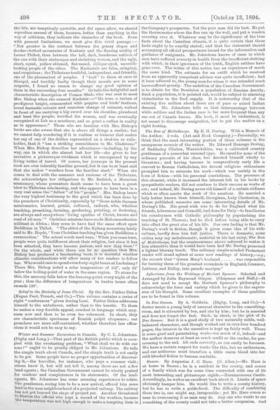The Ban of Halethorpe. By E. H. Daring. With a
Memoir of the Author. 2 vols. (Art and Book Company.)—Personally, we think that the moat interesting portion of these volumes is the anonymous memoir of the writer. Mr, Edward Heneage Bering, of Baddesley Clinton, Warwickshire, was a cultivated country gentleman of a somewhat unusual type. He cared for none of the ordinary pursuits of his class, but devoted himself wholly to literature ; and having become in comparatively early life a convert to Roman Catholicism, his devout religious enthusiasm prompted him to saturate his work—which was mainly in the form of fiction—with his personal convictions. The presence of this element, while it increased the interest felt in his books by sympathetic readers, did not conduce to their success as works of art ; and indeed, Mr. Bering never rid himself of a certain stiffness which so often marks the work of the amateur. He married a lady better known than himself, Georgiana, Lady Chatterton, in whose published memoirs are some interesting details of Mr. Daring's life. His great wish was to do for England what his friends, Liberatore and Cornoldi, had done for Italy—to familiarise his countrymen with Catholic philosophy by popularising the teaching of St. Thomas ; but he died before being able to carry into effect the great aim of his life. Our own feeling is that Mr. Daring's work in fiction, though it gives some idea of his wide culture, hardly does him full justice. There is dramatic, some critics may say melodramatic, material in his last story, The Ban of Ifablethorpe, but the cumbrousness above referred to makes it less attractive than it would have been had Mr. Bering possessed a lighter literary touch. The ordinary simple-minded Protestant reader will stand aghast at some new readings of history,-.-e.g.,
the remark that " Queen Mary's husband was responsible for turning three of the greatest scoundrels in England, Cranmer, Latimer, and Ridley, into pseudo martyrs."


















































 Previous page
Previous page